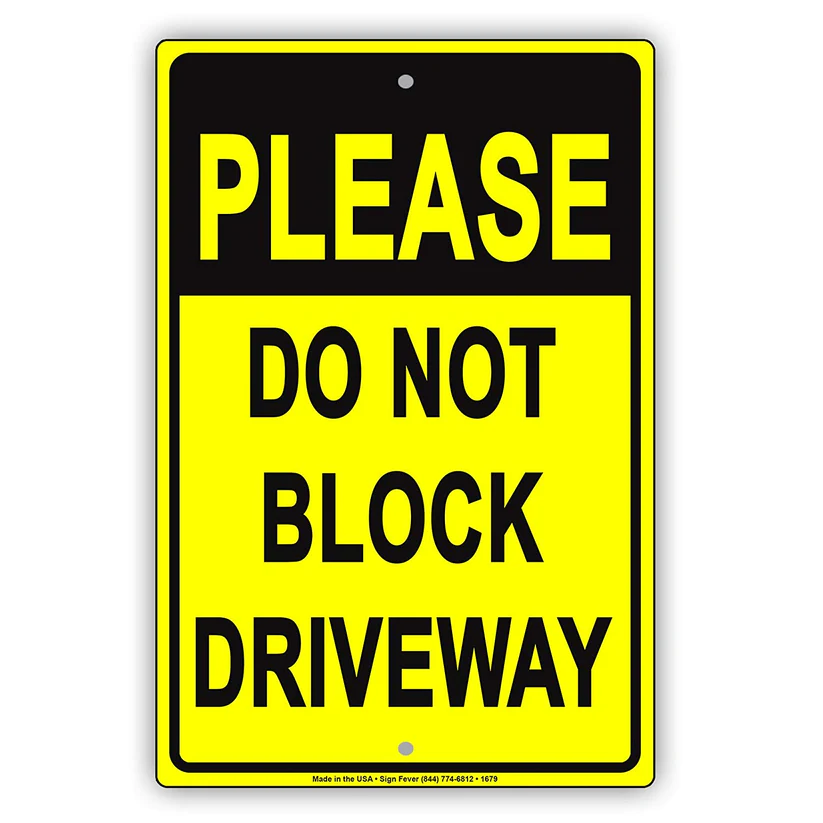In neighborhoods, business areas, and busy urban streets, one of the most common frustrations for property owners is finding their driveway blocked by parked vehicles. Whether it’s a delivery truck, a visitor, or a careless driver, a blocked driveway can cause major inconvenience and even safety hazards. That’s why “Do Not Block Driveway signs” are an essential solution for maintaining access, safety, and order on both residential and commercial properties.
These simple yet effective signs communicate a clear message that helps prevent unwanted parking and ensures that driveways remain accessible at all times. Let’s explore why they’re so important, where to use them, and what to consider when choosing the right sign for your property.
The Importance of Do Not Block Driveway Signs
The primary purpose of a “Do Not Block Driveway” sign is to ensure clear and unobstructed access to a property. Whether it’s a home, business, or public facility, vehicles need to be able to enter and exit freely without interference.
Blocking a driveway isn’t just inconvenient — in many cases, it’s illegal. Most cities have parking regulations that prohibit vehicles from obstructing driveways, and violators may face fines or towing. However, without visible signage, drivers might claim they didn’t know or simply overlook the restriction.
A well-placed sign removes any doubt. It communicates the rule clearly, discourages inconsiderate parking, and helps protect your property rights. For businesses, it also ensures smooth traffic flow for customers, delivery drivers, and emergency vehicles.
Where These Signs Are Commonly Used
“Do Not Block Driveway” signs are versatile and can be used in various locations, including:
-
Residential Properties: Homeowners often place them near the entrance or along the curb to prevent vehicles from parking across their driveways.
-
Commercial Buildings: Offices, warehouses, and retail stores use these signs to keep loading zones and driveways accessible.
-
Parking Lots and Garages: Signs help guide vehicles and maintain traffic order within busy areas.
-
Schools and Hospitals: These facilities rely on clear access points for drop-offs, pick-ups, and emergency vehicles.
-
Event Venues: During special events or gatherings, temporary “Do Not Block” signage helps manage crowds and traffic efficiently.
In short, wherever vehicles come and go, these signs serve a vital role in keeping things running smoothly.
Design and Visibility – What Makes an Effective Sign
A “Do Not Block Driveway” sign needs to be easily noticeable and understandable, even from a distance. Because they often compete with other visual distractions on the street, clarity is key.
Here are some important design elements to consider:
-
Bold, Clear Text: The message should be simple and direct, usually in capital letters for easy readability.
-
High-Contrast Colors: Red, white, and black are common choices because they catch attention quickly and are easy to read.
-
Reflective Surface: For night visibility, reflective materials ensure the sign can be seen under headlights or streetlights.
-
Durable Materials: Outdoor signs should be made from weather-resistant materials such as aluminum, steel, or heavy-duty plastic to withstand sunlight, rain, and temperature changes.
-
Optional Graphics: Some signs include images like a tow truck or “No Parking” symbol for added emphasis.
Good signage not only conveys the rule but also makes it visually impossible for drivers to claim they didn’t see it.
Customization Options
Many property owners and businesses prefer custom “Do Not Block Driveway” signs to match their specific needs. For example, a personalized sign might include:
-
The name of the business or property owner.
-
A warning such as “Violators Will Be Towed.”
-
A phone number to call in case of emergency access needs.
-
Multilingual text for diverse communities.
Custom signs help reinforce authority while maintaining consistency with your property’s overall look or brand identity.
Legal and Enforcement Considerations
In many municipalities, “Do Not Block Driveway” signs carry legal backing if properly installed according to local regulations. This means that if a vehicle blocks your driveway despite the sign, you may have the right to contact authorities to issue a ticket or have the vehicle towed.
However, it’s important to follow local laws when installing these signs. Some areas require permits or specific placement guidelines, especially for signs on public roads. Always check with your city’s parking enforcement department to ensure compliance.
Proper Placement for Maximum Effectiveness
Where you place your sign can make all the difference. Ideally, it should be:
-
At eye level so it’s visible to drivers approaching from either direction.
-
Near the driveway entrance or curb where vehicles are likely to park.
-
Free from obstructions, such as trees or parked cars, that might block the view.
Some property owners also install two signs — one on each side of the driveway — for added visibility.
Conclusion
A “Do Not Block Driveway” sign might seem like a small addition, but it can make a big difference in maintaining accessibility, order, and safety. Whether you live in a busy city neighborhood or manage a commercial property, these signs serve as a clear reminder that driveways must remain open at all times.
By choosing durable, easy-to-read, and properly placed signage, you can prevent unnecessary conflicts, avoid blocked access, and ensure that traffic flows smoothly. For peace of mind and convenience, investing in a quality Do Not Block Driveway sign is one of the simplest and smartest decisions a property owner can make.

